Analyzing Theories, Principles and Models for Teaching (Unit 3)
VerifiedAdded on 2023/06/09
|18
|4709
|297
Report
AI Summary
This report undertakes a personal review, incorporating reflective accounts and essential theories and principles for effective and inclusive teaching and training practices. It explores theories and models related to reflection and evaluation, analyzing models like Kolb's and Gibbs' reflective cycles, and explaining their application in reviewing one's own practice. The report also examines theories and models of learning, including behaviorism and cognitivism, and explains their application in teaching, learning, and assessment. Furthermore, it analyzes learning preference models, such as those by Honey and Mumford, and discusses how identifying these preferences enables inclusive teaching. Finally, it delves into communication, assessment, and curriculum development theories, explaining their practical applications in educational settings. The report emphasizes the importance of these theories in creating a supportive and effective learning environment.
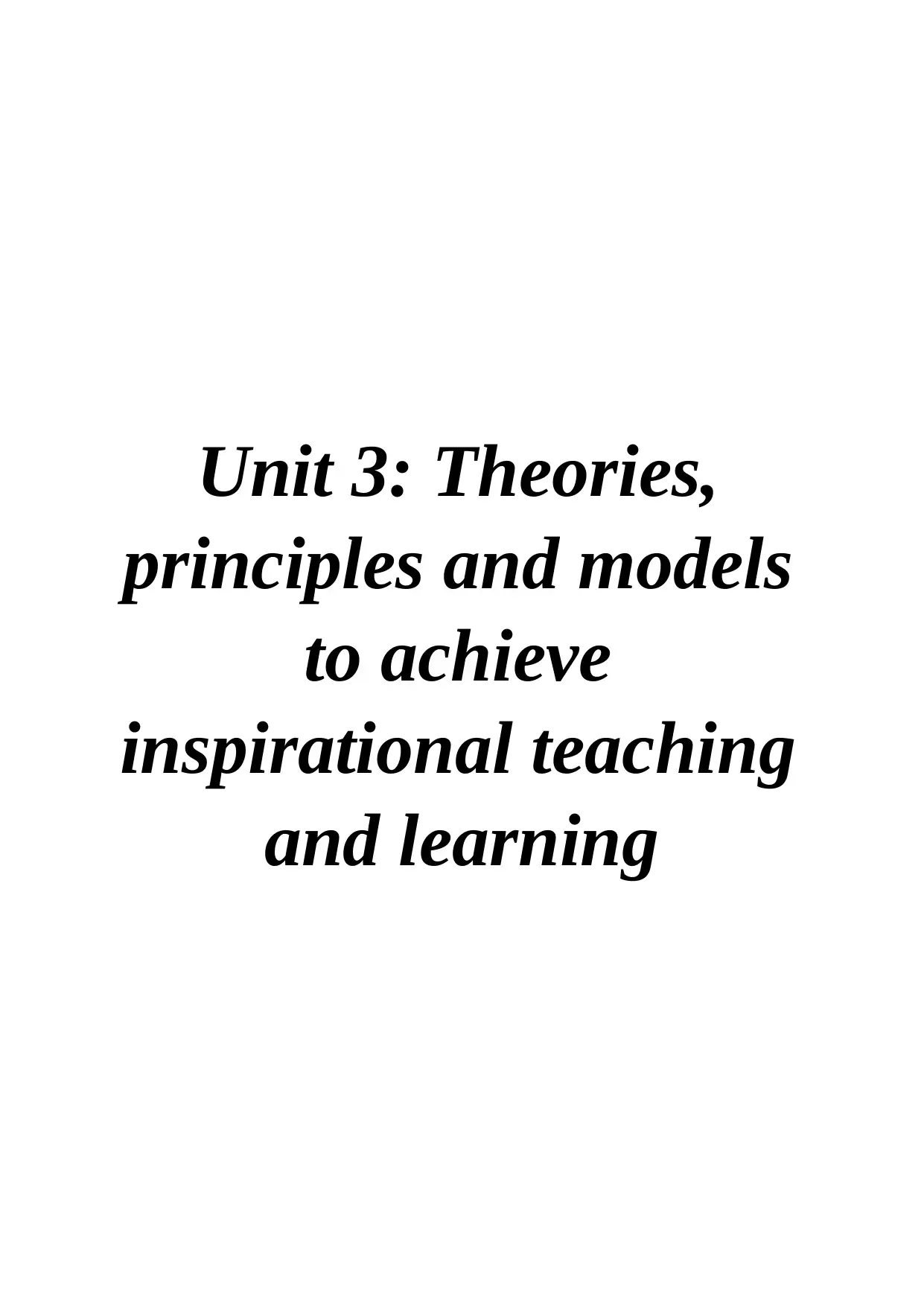
Unit 3: Theories,
principles and models
to achieve
inspirational teaching
and learning
principles and models
to achieve
inspirational teaching
and learning
Paraphrase This Document
Need a fresh take? Get an instant paraphrase of this document with our AI Paraphraser
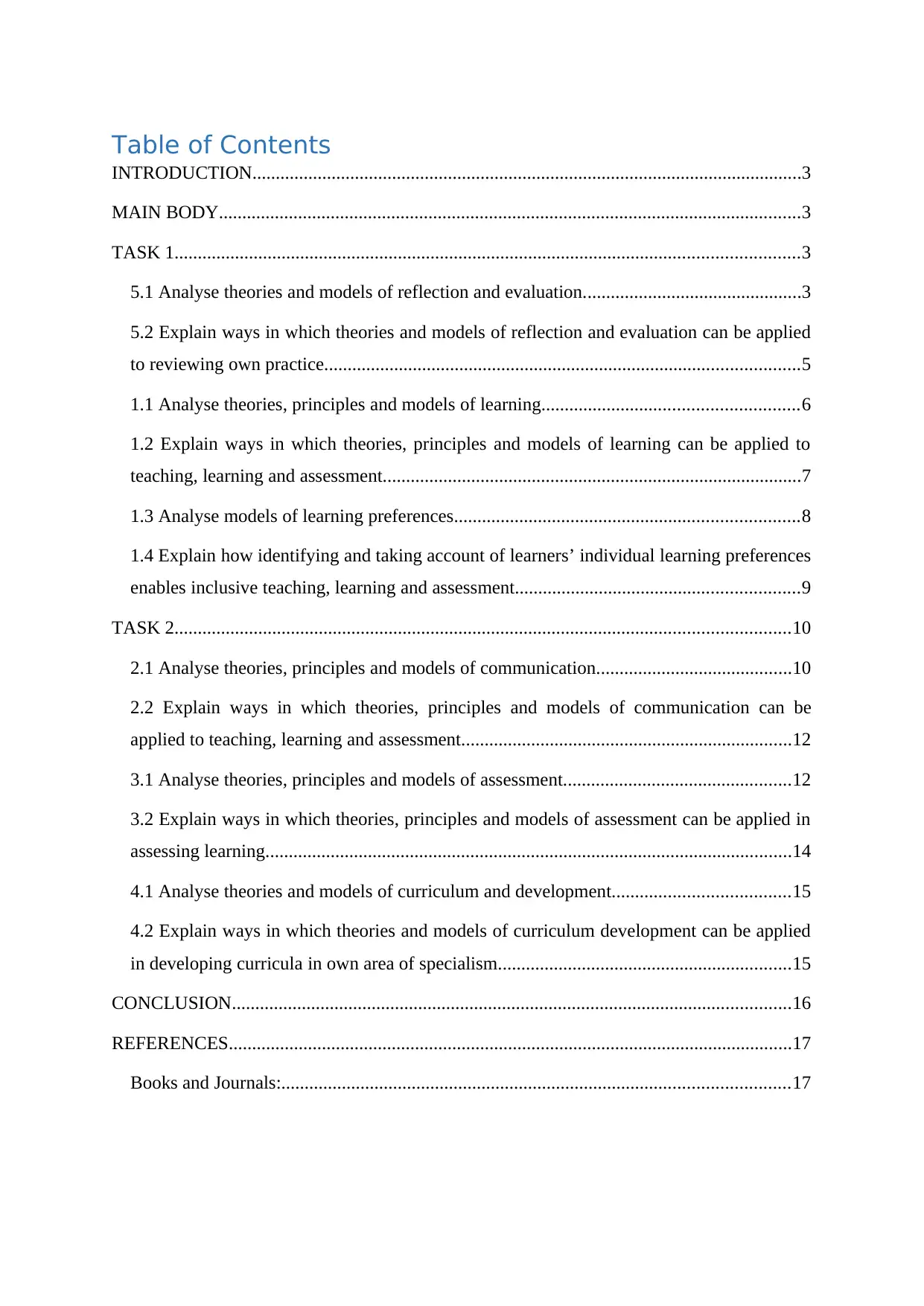
Table of Contents
INTRODUCTION......................................................................................................................3
MAIN BODY.............................................................................................................................3
TASK 1......................................................................................................................................3
5.1 Analyse theories and models of reflection and evaluation...............................................3
5.2 Explain ways in which theories and models of reflection and evaluation can be applied
to reviewing own practice......................................................................................................5
1.1 Analyse theories, principles and models of learning.......................................................6
1.2 Explain ways in which theories, principles and models of learning can be applied to
teaching, learning and assessment..........................................................................................7
1.3 Analyse models of learning preferences..........................................................................8
1.4 Explain how identifying and taking account of learners’ individual learning preferences
enables inclusive teaching, learning and assessment.............................................................9
TASK 2....................................................................................................................................10
2.1 Analyse theories, principles and models of communication..........................................10
2.2 Explain ways in which theories, principles and models of communication can be
applied to teaching, learning and assessment.......................................................................12
3.1 Analyse theories, principles and models of assessment.................................................12
3.2 Explain ways in which theories, principles and models of assessment can be applied in
assessing learning.................................................................................................................14
4.1 Analyse theories and models of curriculum and development......................................15
4.2 Explain ways in which theories and models of curriculum development can be applied
in developing curricula in own area of specialism...............................................................15
CONCLUSION........................................................................................................................16
REFERENCES.........................................................................................................................17
Books and Journals:.............................................................................................................17
INTRODUCTION......................................................................................................................3
MAIN BODY.............................................................................................................................3
TASK 1......................................................................................................................................3
5.1 Analyse theories and models of reflection and evaluation...............................................3
5.2 Explain ways in which theories and models of reflection and evaluation can be applied
to reviewing own practice......................................................................................................5
1.1 Analyse theories, principles and models of learning.......................................................6
1.2 Explain ways in which theories, principles and models of learning can be applied to
teaching, learning and assessment..........................................................................................7
1.3 Analyse models of learning preferences..........................................................................8
1.4 Explain how identifying and taking account of learners’ individual learning preferences
enables inclusive teaching, learning and assessment.............................................................9
TASK 2....................................................................................................................................10
2.1 Analyse theories, principles and models of communication..........................................10
2.2 Explain ways in which theories, principles and models of communication can be
applied to teaching, learning and assessment.......................................................................12
3.1 Analyse theories, principles and models of assessment.................................................12
3.2 Explain ways in which theories, principles and models of assessment can be applied in
assessing learning.................................................................................................................14
4.1 Analyse theories and models of curriculum and development......................................15
4.2 Explain ways in which theories and models of curriculum development can be applied
in developing curricula in own area of specialism...............................................................15
CONCLUSION........................................................................................................................16
REFERENCES.........................................................................................................................17
Books and Journals:.............................................................................................................17
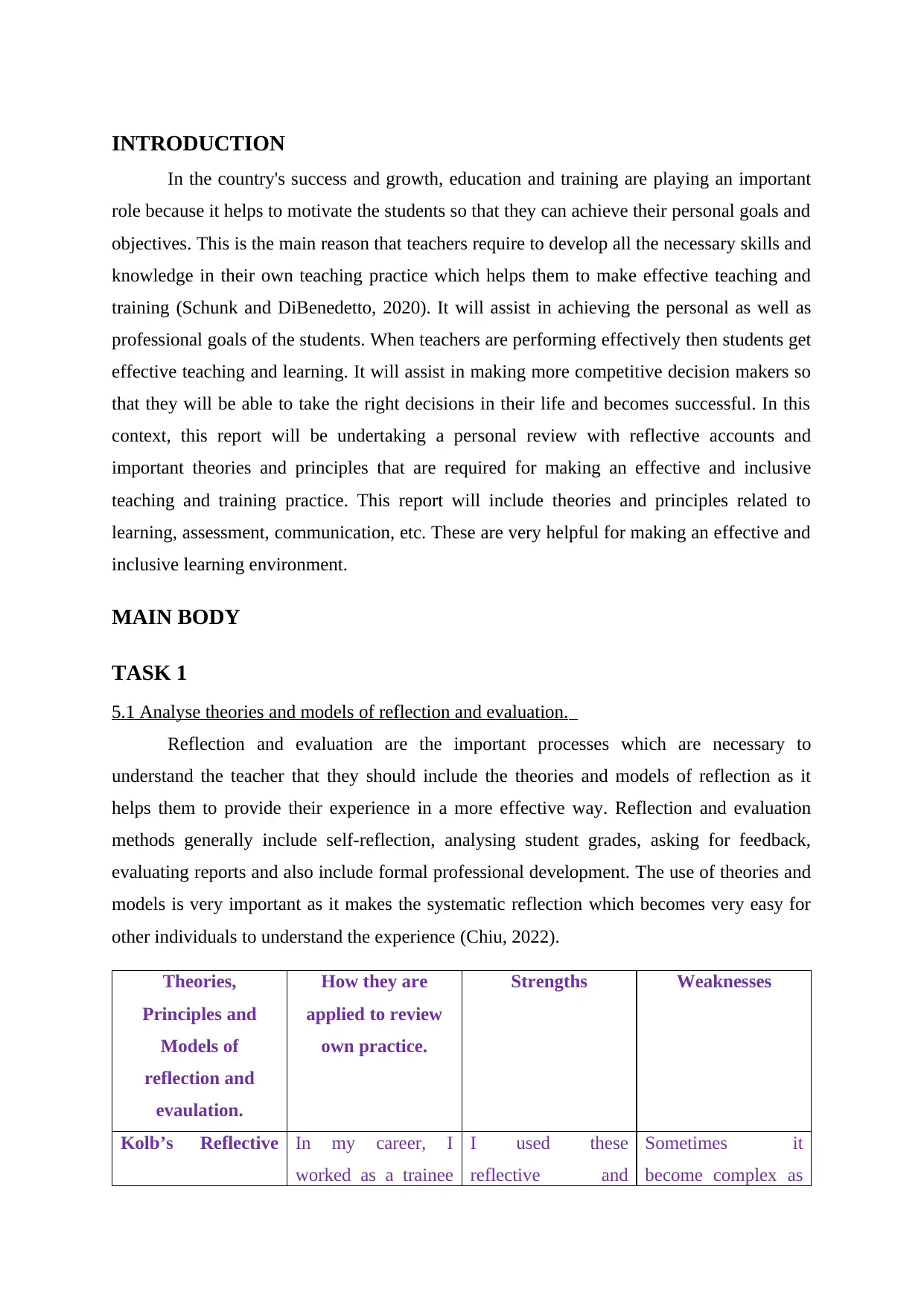
INTRODUCTION
In the country's success and growth, education and training are playing an important
role because it helps to motivate the students so that they can achieve their personal goals and
objectives. This is the main reason that teachers require to develop all the necessary skills and
knowledge in their own teaching practice which helps them to make effective teaching and
training (Schunk and DiBenedetto, 2020). It will assist in achieving the personal as well as
professional goals of the students. When teachers are performing effectively then students get
effective teaching and learning. It will assist in making more competitive decision makers so
that they will be able to take the right decisions in their life and becomes successful. In this
context, this report will be undertaking a personal review with reflective accounts and
important theories and principles that are required for making an effective and inclusive
teaching and training practice. This report will include theories and principles related to
learning, assessment, communication, etc. These are very helpful for making an effective and
inclusive learning environment.
MAIN BODY
TASK 1
5.1 Analyse theories and models of reflection and evaluation.
Reflection and evaluation are the important processes which are necessary to
understand the teacher that they should include the theories and models of reflection as it
helps them to provide their experience in a more effective way. Reflection and evaluation
methods generally include self-reflection, analysing student grades, asking for feedback,
evaluating reports and also include formal professional development. The use of theories and
models is very important as it makes the systematic reflection which becomes very easy for
other individuals to understand the experience (Chiu, 2022).
Theories,
Principles and
Models of
reflection and
evaulation.
How they are
applied to review
own practice.
Strengths Weaknesses
Kolb’s Reflective In my career, I
worked as a trainee
I used these
reflective and
Sometimes it
become complex as
In the country's success and growth, education and training are playing an important
role because it helps to motivate the students so that they can achieve their personal goals and
objectives. This is the main reason that teachers require to develop all the necessary skills and
knowledge in their own teaching practice which helps them to make effective teaching and
training (Schunk and DiBenedetto, 2020). It will assist in achieving the personal as well as
professional goals of the students. When teachers are performing effectively then students get
effective teaching and learning. It will assist in making more competitive decision makers so
that they will be able to take the right decisions in their life and becomes successful. In this
context, this report will be undertaking a personal review with reflective accounts and
important theories and principles that are required for making an effective and inclusive
teaching and training practice. This report will include theories and principles related to
learning, assessment, communication, etc. These are very helpful for making an effective and
inclusive learning environment.
MAIN BODY
TASK 1
5.1 Analyse theories and models of reflection and evaluation.
Reflection and evaluation are the important processes which are necessary to
understand the teacher that they should include the theories and models of reflection as it
helps them to provide their experience in a more effective way. Reflection and evaluation
methods generally include self-reflection, analysing student grades, asking for feedback,
evaluating reports and also include formal professional development. The use of theories and
models is very important as it makes the systematic reflection which becomes very easy for
other individuals to understand the experience (Chiu, 2022).
Theories,
Principles and
Models of
reflection and
evaulation.
How they are
applied to review
own practice.
Strengths Weaknesses
Kolb’s Reflective In my career, I
worked as a trainee
I used these
reflective and
Sometimes it
become complex as
⊘ This is a preview!⊘
Do you want full access?
Subscribe today to unlock all pages.

Trusted by 1+ million students worldwide
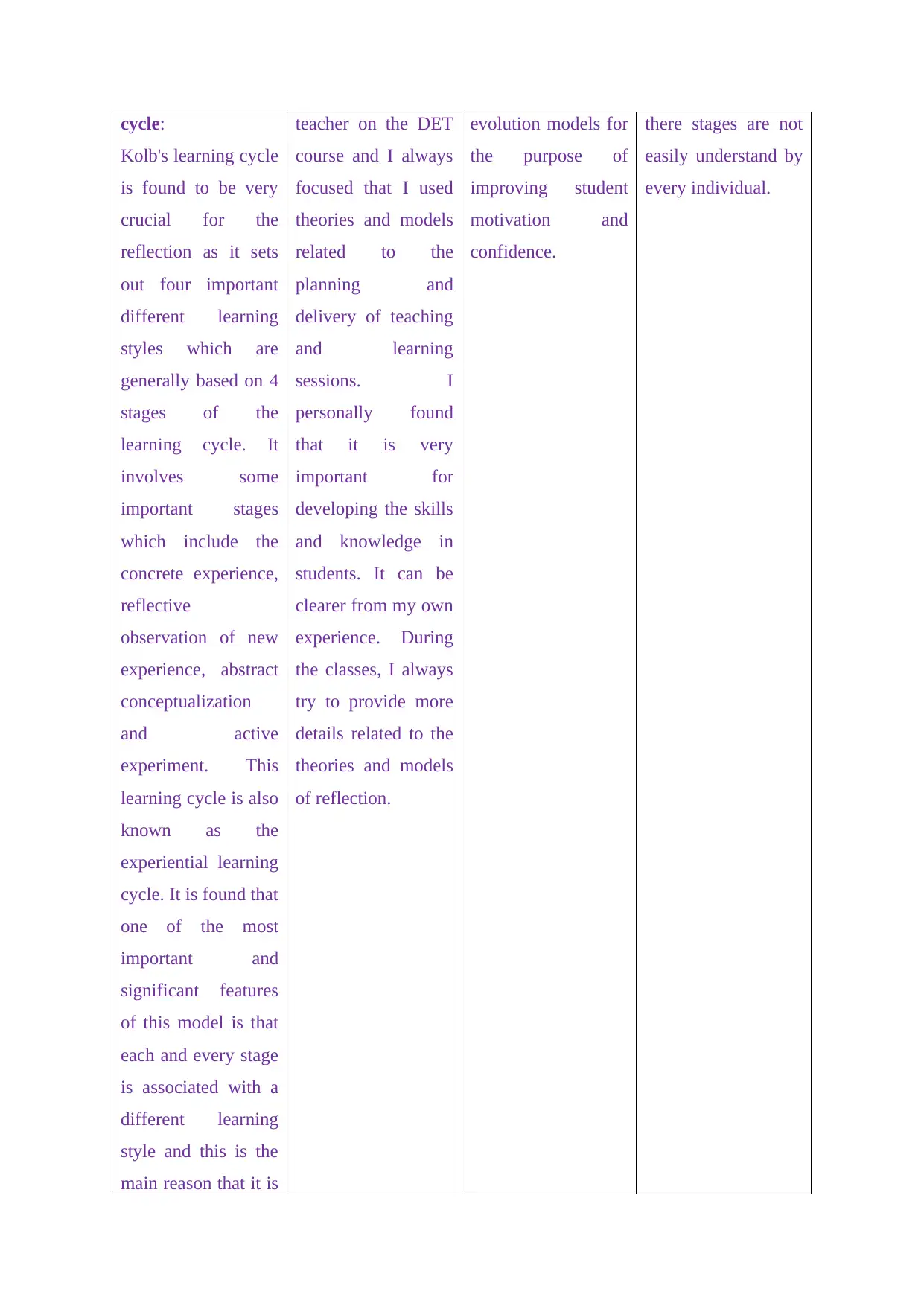
cycle:
Kolb's learning cycle
is found to be very
crucial for the
reflection as it sets
out four important
different learning
styles which are
generally based on 4
stages of the
learning cycle. It
involves some
important stages
which include the
concrete experience,
reflective
observation of new
experience, abstract
conceptualization
and active
experiment. This
learning cycle is also
known as the
experiential learning
cycle. It is found that
one of the most
important and
significant features
of this model is that
each and every stage
is associated with a
different learning
style and this is the
main reason that it is
teacher on the DET
course and I always
focused that I used
theories and models
related to the
planning and
delivery of teaching
and learning
sessions. I
personally found
that it is very
important for
developing the skills
and knowledge in
students. It can be
clearer from my own
experience. During
the classes, I always
try to provide more
details related to the
theories and models
of reflection.
evolution models for
the purpose of
improving student
motivation and
confidence.
there stages are not
easily understand by
every individual.
Kolb's learning cycle
is found to be very
crucial for the
reflection as it sets
out four important
different learning
styles which are
generally based on 4
stages of the
learning cycle. It
involves some
important stages
which include the
concrete experience,
reflective
observation of new
experience, abstract
conceptualization
and active
experiment. This
learning cycle is also
known as the
experiential learning
cycle. It is found that
one of the most
important and
significant features
of this model is that
each and every stage
is associated with a
different learning
style and this is the
main reason that it is
teacher on the DET
course and I always
focused that I used
theories and models
related to the
planning and
delivery of teaching
and learning
sessions. I
personally found
that it is very
important for
developing the skills
and knowledge in
students. It can be
clearer from my own
experience. During
the classes, I always
try to provide more
details related to the
theories and models
of reflection.
evolution models for
the purpose of
improving student
motivation and
confidence.
there stages are not
easily understand by
every individual.
Paraphrase This Document
Need a fresh take? Get an instant paraphrase of this document with our AI Paraphraser
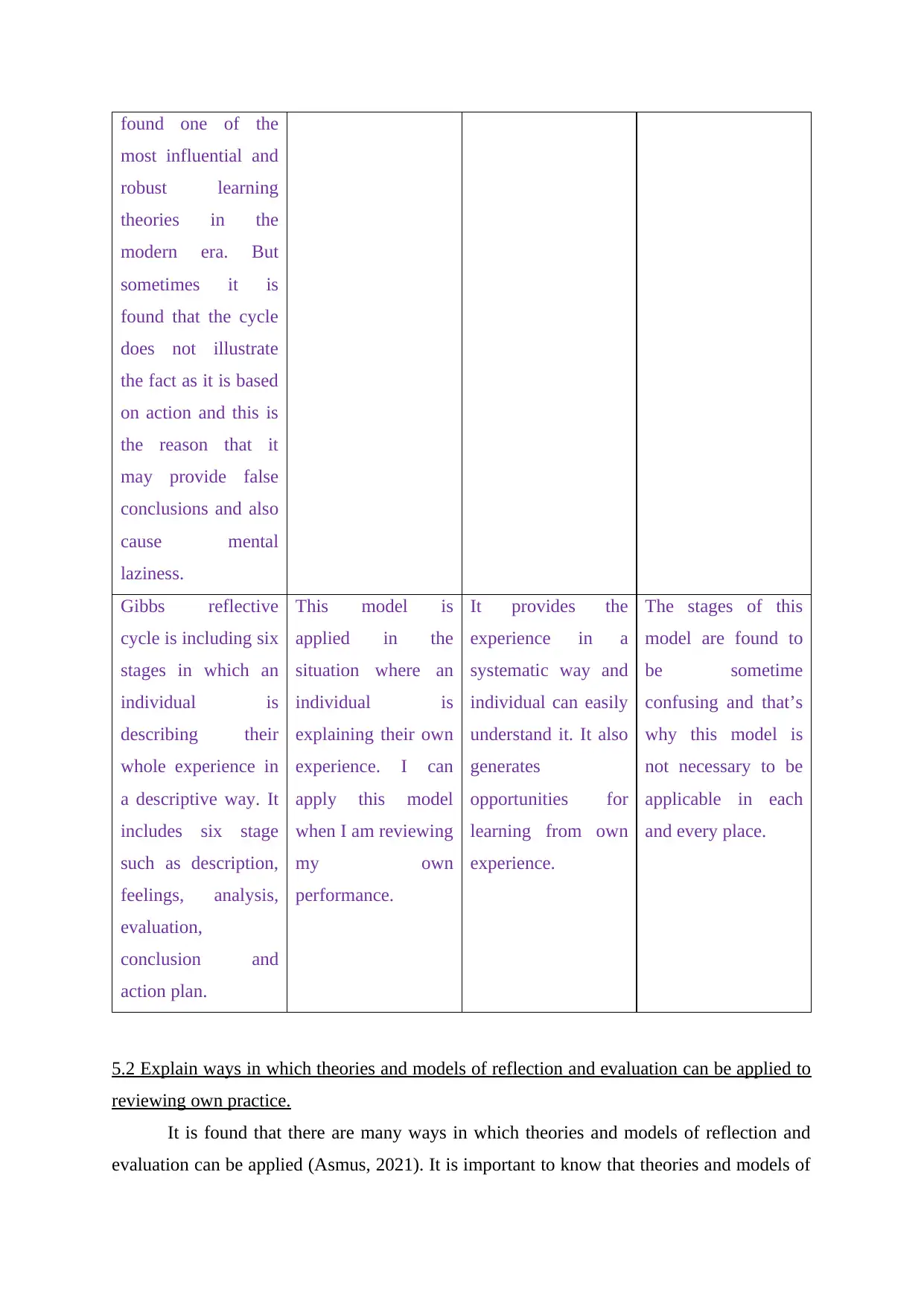
found one of the
most influential and
robust learning
theories in the
modern era. But
sometimes it is
found that the cycle
does not illustrate
the fact as it is based
on action and this is
the reason that it
may provide false
conclusions and also
cause mental
laziness.
Gibbs reflective
cycle is including six
stages in which an
individual is
describing their
whole experience in
a descriptive way. It
includes six stage
such as description,
feelings, analysis,
evaluation,
conclusion and
action plan.
This model is
applied in the
situation where an
individual is
explaining their own
experience. I can
apply this model
when I am reviewing
my own
performance.
It provides the
experience in a
systematic way and
individual can easily
understand it. It also
generates
opportunities for
learning from own
experience.
The stages of this
model are found to
be sometime
confusing and that’s
why this model is
not necessary to be
applicable in each
and every place.
5.2 Explain ways in which theories and models of reflection and evaluation can be applied to
reviewing own practice.
It is found that there are many ways in which theories and models of reflection and
evaluation can be applied (Asmus, 2021). It is important to know that theories and models of
most influential and
robust learning
theories in the
modern era. But
sometimes it is
found that the cycle
does not illustrate
the fact as it is based
on action and this is
the reason that it
may provide false
conclusions and also
cause mental
laziness.
Gibbs reflective
cycle is including six
stages in which an
individual is
describing their
whole experience in
a descriptive way. It
includes six stage
such as description,
feelings, analysis,
evaluation,
conclusion and
action plan.
This model is
applied in the
situation where an
individual is
explaining their own
experience. I can
apply this model
when I am reviewing
my own
performance.
It provides the
experience in a
systematic way and
individual can easily
understand it. It also
generates
opportunities for
learning from own
experience.
The stages of this
model are found to
be sometime
confusing and that’s
why this model is
not necessary to be
applicable in each
and every place.
5.2 Explain ways in which theories and models of reflection and evaluation can be applied to
reviewing own practice.
It is found that there are many ways in which theories and models of reflection and
evaluation can be applied (Asmus, 2021). It is important to know that theories and models of
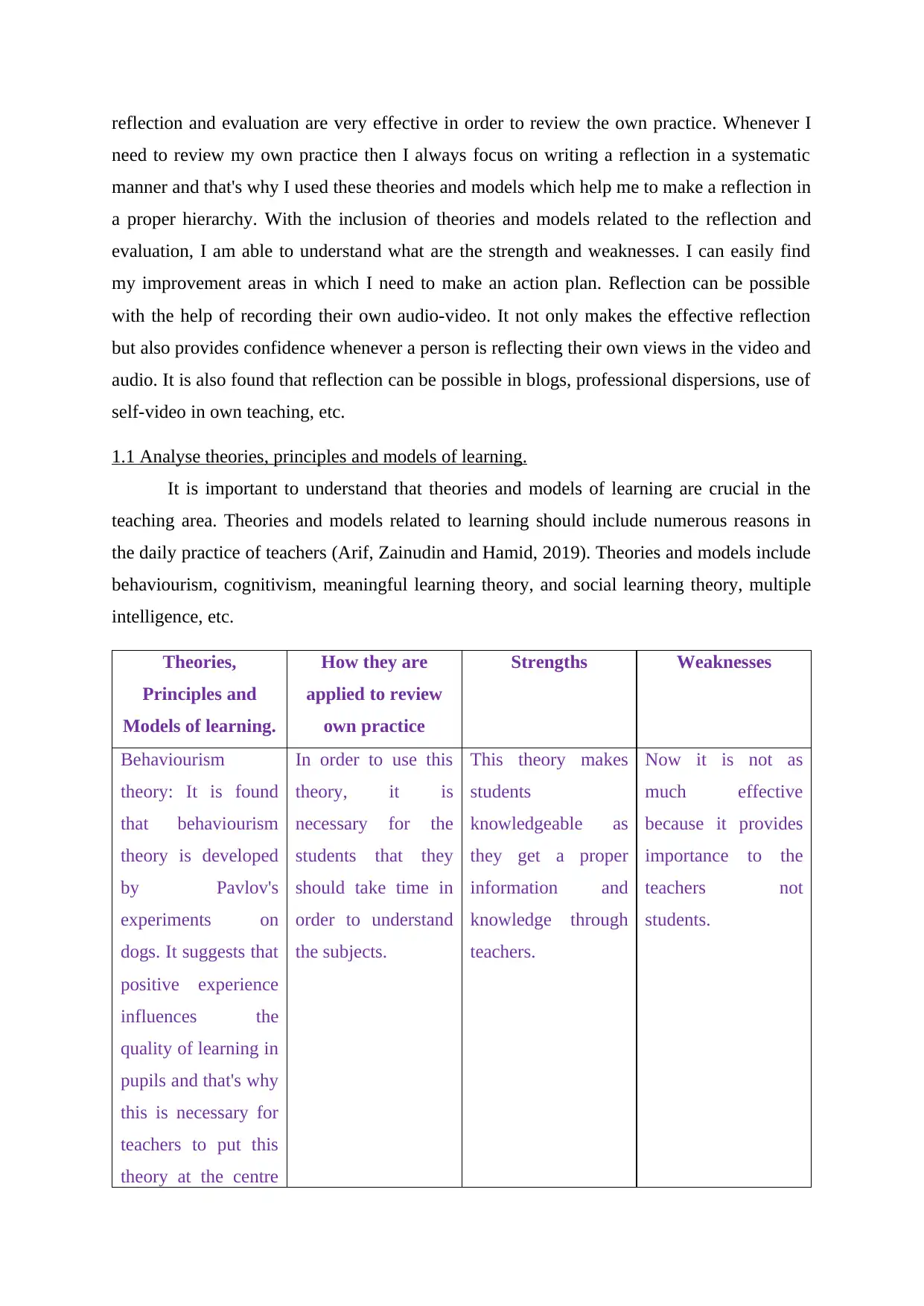
reflection and evaluation are very effective in order to review the own practice. Whenever I
need to review my own practice then I always focus on writing a reflection in a systematic
manner and that's why I used these theories and models which help me to make a reflection in
a proper hierarchy. With the inclusion of theories and models related to the reflection and
evaluation, I am able to understand what are the strength and weaknesses. I can easily find
my improvement areas in which I need to make an action plan. Reflection can be possible
with the help of recording their own audio-video. It not only makes the effective reflection
but also provides confidence whenever a person is reflecting their own views in the video and
audio. It is also found that reflection can be possible in blogs, professional dispersions, use of
self-video in own teaching, etc.
1.1 Analyse theories, principles and models of learning.
It is important to understand that theories and models of learning are crucial in the
teaching area. Theories and models related to learning should include numerous reasons in
the daily practice of teachers (Arif, Zainudin and Hamid, 2019). Theories and models include
behaviourism, cognitivism, meaningful learning theory, and social learning theory, multiple
intelligence, etc.
Theories,
Principles and
Models of learning.
How they are
applied to review
own practice
Strengths Weaknesses
Behaviourism
theory: It is found
that behaviourism
theory is developed
by Pavlov's
experiments on
dogs. It suggests that
positive experience
influences the
quality of learning in
pupils and that's why
this is necessary for
teachers to put this
theory at the centre
In order to use this
theory, it is
necessary for the
students that they
should take time in
order to understand
the subjects.
This theory makes
students
knowledgeable as
they get a proper
information and
knowledge through
teachers.
Now it is not as
much effective
because it provides
importance to the
teachers not
students.
need to review my own practice then I always focus on writing a reflection in a systematic
manner and that's why I used these theories and models which help me to make a reflection in
a proper hierarchy. With the inclusion of theories and models related to the reflection and
evaluation, I am able to understand what are the strength and weaknesses. I can easily find
my improvement areas in which I need to make an action plan. Reflection can be possible
with the help of recording their own audio-video. It not only makes the effective reflection
but also provides confidence whenever a person is reflecting their own views in the video and
audio. It is also found that reflection can be possible in blogs, professional dispersions, use of
self-video in own teaching, etc.
1.1 Analyse theories, principles and models of learning.
It is important to understand that theories and models of learning are crucial in the
teaching area. Theories and models related to learning should include numerous reasons in
the daily practice of teachers (Arif, Zainudin and Hamid, 2019). Theories and models include
behaviourism, cognitivism, meaningful learning theory, and social learning theory, multiple
intelligence, etc.
Theories,
Principles and
Models of learning.
How they are
applied to review
own practice
Strengths Weaknesses
Behaviourism
theory: It is found
that behaviourism
theory is developed
by Pavlov's
experiments on
dogs. It suggests that
positive experience
influences the
quality of learning in
pupils and that's why
this is necessary for
teachers to put this
theory at the centre
In order to use this
theory, it is
necessary for the
students that they
should take time in
order to understand
the subjects.
This theory makes
students
knowledgeable as
they get a proper
information and
knowledge through
teachers.
Now it is not as
much effective
because it provides
importance to the
teachers not
students.
⊘ This is a preview!⊘
Do you want full access?
Subscribe today to unlock all pages.

Trusted by 1+ million students worldwide
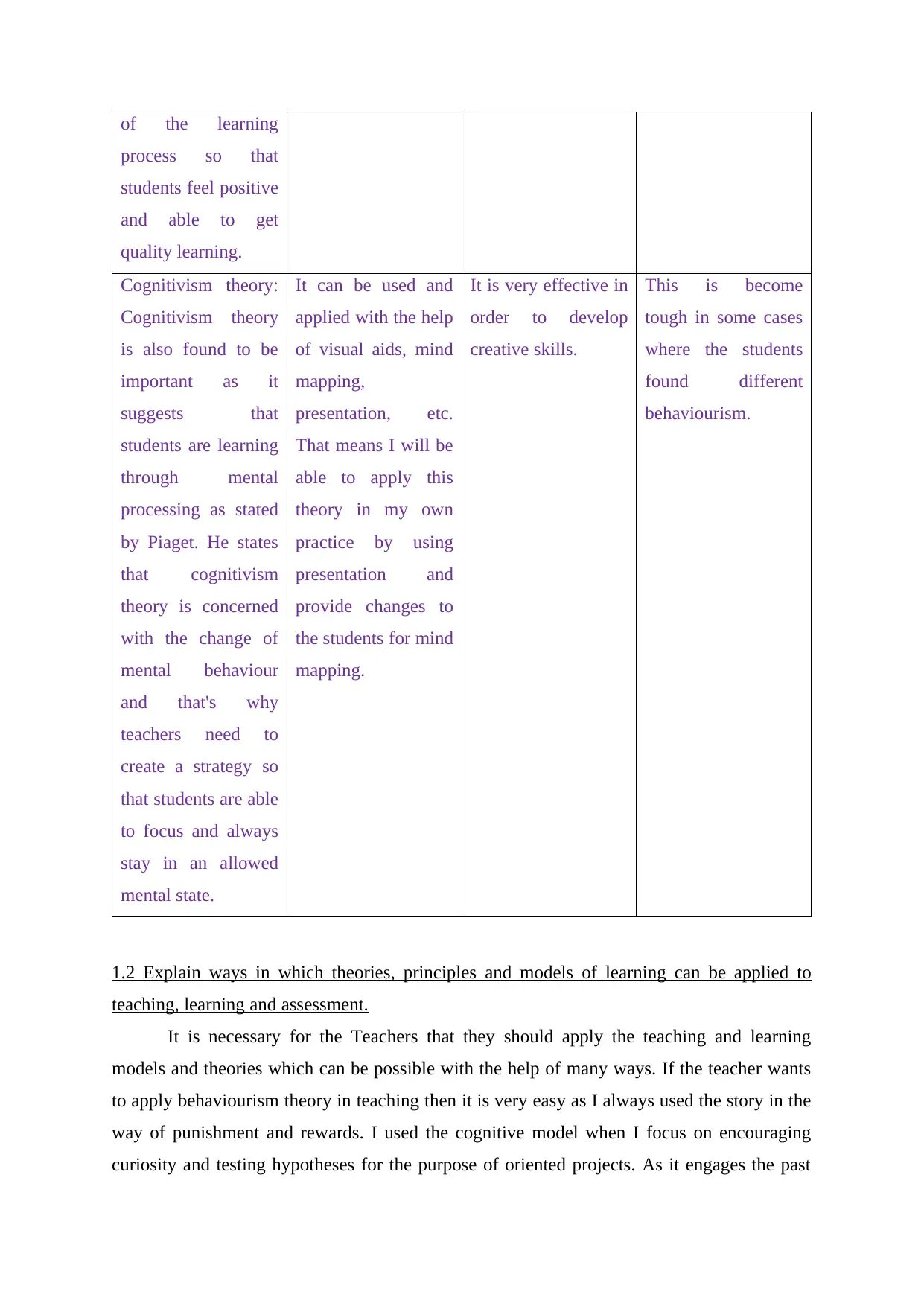
of the learning
process so that
students feel positive
and able to get
quality learning.
Cognitivism theory:
Cognitivism theory
is also found to be
important as it
suggests that
students are learning
through mental
processing as stated
by Piaget. He states
that cognitivism
theory is concerned
with the change of
mental behaviour
and that's why
teachers need to
create a strategy so
that students are able
to focus and always
stay in an allowed
mental state.
It can be used and
applied with the help
of visual aids, mind
mapping,
presentation, etc.
That means I will be
able to apply this
theory in my own
practice by using
presentation and
provide changes to
the students for mind
mapping.
It is very effective in
order to develop
creative skills.
This is become
tough in some cases
where the students
found different
behaviourism.
1.2 Explain ways in which theories, principles and models of learning can be applied to
teaching, learning and assessment.
It is necessary for the Teachers that they should apply the teaching and learning
models and theories which can be possible with the help of many ways. If the teacher wants
to apply behaviourism theory in teaching then it is very easy as I always used the story in the
way of punishment and rewards. I used the cognitive model when I focus on encouraging
curiosity and testing hypotheses for the purpose of oriented projects. As it engages the past
process so that
students feel positive
and able to get
quality learning.
Cognitivism theory:
Cognitivism theory
is also found to be
important as it
suggests that
students are learning
through mental
processing as stated
by Piaget. He states
that cognitivism
theory is concerned
with the change of
mental behaviour
and that's why
teachers need to
create a strategy so
that students are able
to focus and always
stay in an allowed
mental state.
It can be used and
applied with the help
of visual aids, mind
mapping,
presentation, etc.
That means I will be
able to apply this
theory in my own
practice by using
presentation and
provide changes to
the students for mind
mapping.
It is very effective in
order to develop
creative skills.
This is become
tough in some cases
where the students
found different
behaviourism.
1.2 Explain ways in which theories, principles and models of learning can be applied to
teaching, learning and assessment.
It is necessary for the Teachers that they should apply the teaching and learning
models and theories which can be possible with the help of many ways. If the teacher wants
to apply behaviourism theory in teaching then it is very easy as I always used the story in the
way of punishment and rewards. I used the cognitive model when I focus on encouraging
curiosity and testing hypotheses for the purpose of oriented projects. As it engages the past
Paraphrase This Document
Need a fresh take? Get an instant paraphrase of this document with our AI Paraphraser
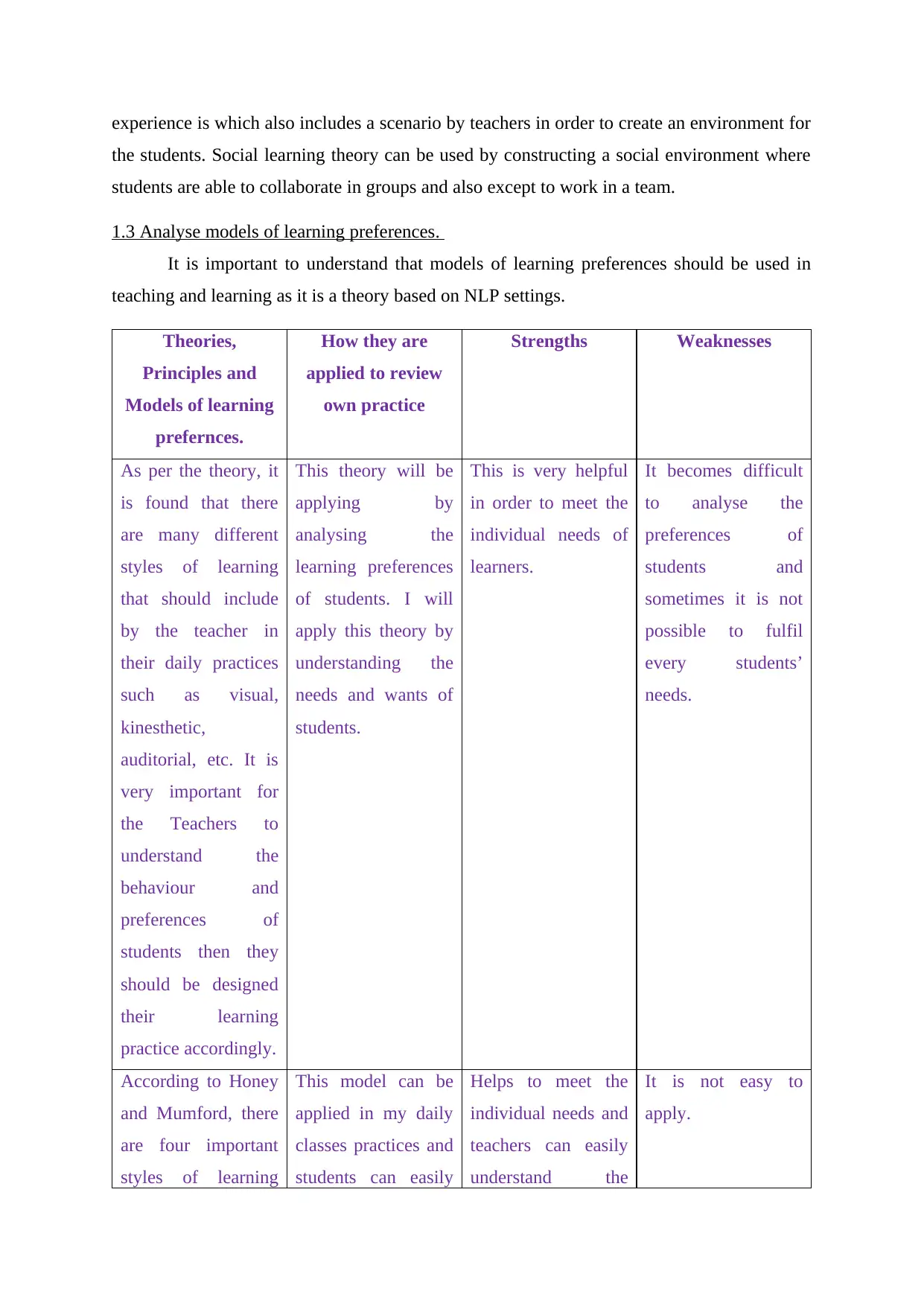
experience is which also includes a scenario by teachers in order to create an environment for
the students. Social learning theory can be used by constructing a social environment where
students are able to collaborate in groups and also except to work in a team.
1.3 Analyse models of learning preferences.
It is important to understand that models of learning preferences should be used in
teaching and learning as it is a theory based on NLP settings.
Theories,
Principles and
Models of learning
prefernces.
How they are
applied to review
own practice
Strengths Weaknesses
As per the theory, it
is found that there
are many different
styles of learning
that should include
by the teacher in
their daily practices
such as visual,
kinesthetic,
auditorial, etc. It is
very important for
the Teachers to
understand the
behaviour and
preferences of
students then they
should be designed
their learning
practice accordingly.
This theory will be
applying by
analysing the
learning preferences
of students. I will
apply this theory by
understanding the
needs and wants of
students.
This is very helpful
in order to meet the
individual needs of
learners.
It becomes difficult
to analyse the
preferences of
students and
sometimes it is not
possible to fulfil
every students’
needs.
According to Honey
and Mumford, there
are four important
styles of learning
This model can be
applied in my daily
classes practices and
students can easily
Helps to meet the
individual needs and
teachers can easily
understand the
It is not easy to
apply.
the students. Social learning theory can be used by constructing a social environment where
students are able to collaborate in groups and also except to work in a team.
1.3 Analyse models of learning preferences.
It is important to understand that models of learning preferences should be used in
teaching and learning as it is a theory based on NLP settings.
Theories,
Principles and
Models of learning
prefernces.
How they are
applied to review
own practice
Strengths Weaknesses
As per the theory, it
is found that there
are many different
styles of learning
that should include
by the teacher in
their daily practices
such as visual,
kinesthetic,
auditorial, etc. It is
very important for
the Teachers to
understand the
behaviour and
preferences of
students then they
should be designed
their learning
practice accordingly.
This theory will be
applying by
analysing the
learning preferences
of students. I will
apply this theory by
understanding the
needs and wants of
students.
This is very helpful
in order to meet the
individual needs of
learners.
It becomes difficult
to analyse the
preferences of
students and
sometimes it is not
possible to fulfil
every students’
needs.
According to Honey
and Mumford, there
are four important
styles of learning
This model can be
applied in my daily
classes practices and
students can easily
Helps to meet the
individual needs and
teachers can easily
understand the
It is not easy to
apply.
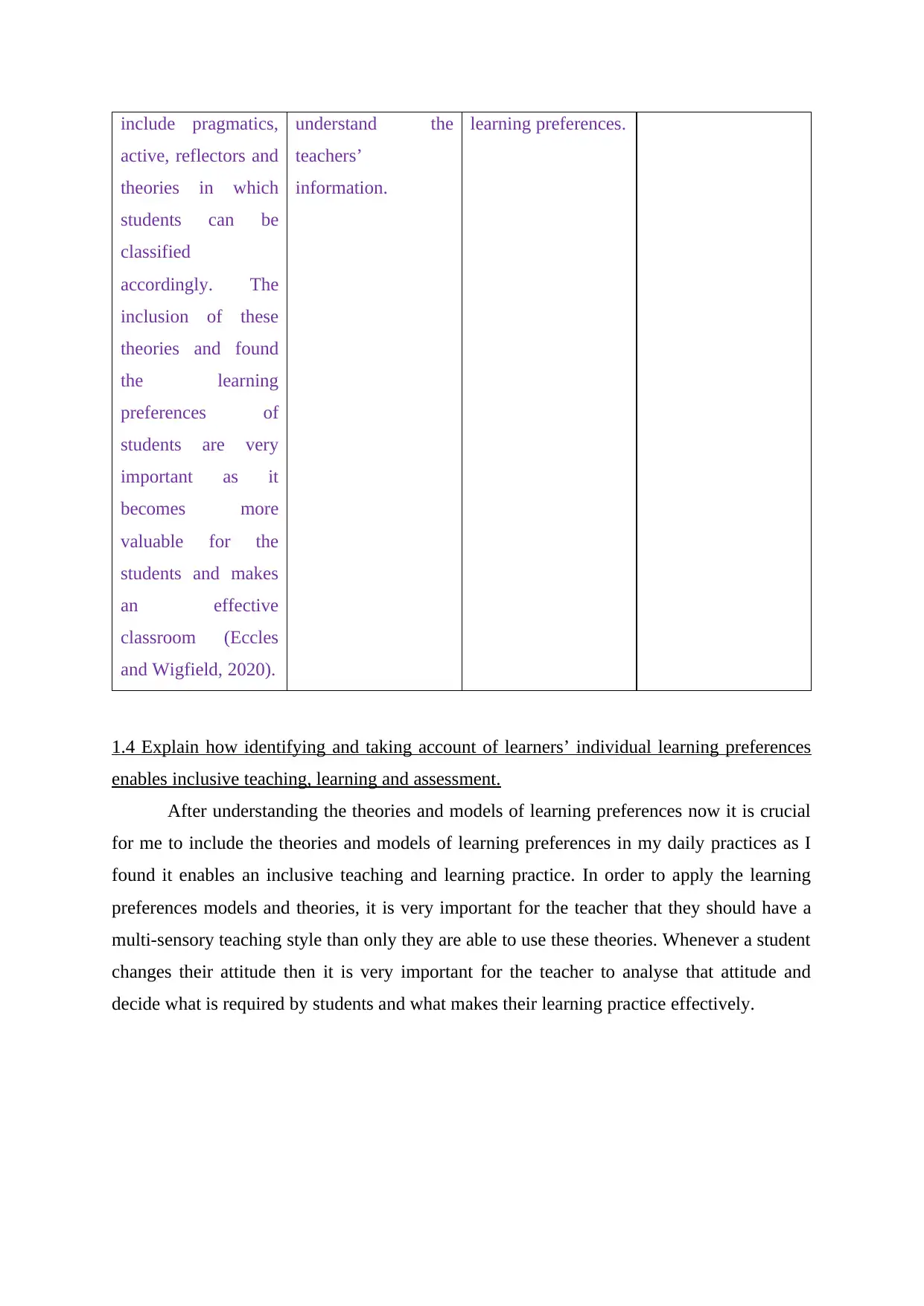
include pragmatics,
active, reflectors and
theories in which
students can be
classified
accordingly. The
inclusion of these
theories and found
the learning
preferences of
students are very
important as it
becomes more
valuable for the
students and makes
an effective
classroom (Eccles
and Wigfield, 2020).
understand the
teachers’
information.
learning preferences.
1.4 Explain how identifying and taking account of learners’ individual learning preferences
enables inclusive teaching, learning and assessment.
After understanding the theories and models of learning preferences now it is crucial
for me to include the theories and models of learning preferences in my daily practices as I
found it enables an inclusive teaching and learning practice. In order to apply the learning
preferences models and theories, it is very important for the teacher that they should have a
multi-sensory teaching style than only they are able to use these theories. Whenever a student
changes their attitude then it is very important for the teacher to analyse that attitude and
decide what is required by students and what makes their learning practice effectively.
active, reflectors and
theories in which
students can be
classified
accordingly. The
inclusion of these
theories and found
the learning
preferences of
students are very
important as it
becomes more
valuable for the
students and makes
an effective
classroom (Eccles
and Wigfield, 2020).
understand the
teachers’
information.
learning preferences.
1.4 Explain how identifying and taking account of learners’ individual learning preferences
enables inclusive teaching, learning and assessment.
After understanding the theories and models of learning preferences now it is crucial
for me to include the theories and models of learning preferences in my daily practices as I
found it enables an inclusive teaching and learning practice. In order to apply the learning
preferences models and theories, it is very important for the teacher that they should have a
multi-sensory teaching style than only they are able to use these theories. Whenever a student
changes their attitude then it is very important for the teacher to analyse that attitude and
decide what is required by students and what makes their learning practice effectively.
⊘ This is a preview!⊘
Do you want full access?
Subscribe today to unlock all pages.

Trusted by 1+ million students worldwide
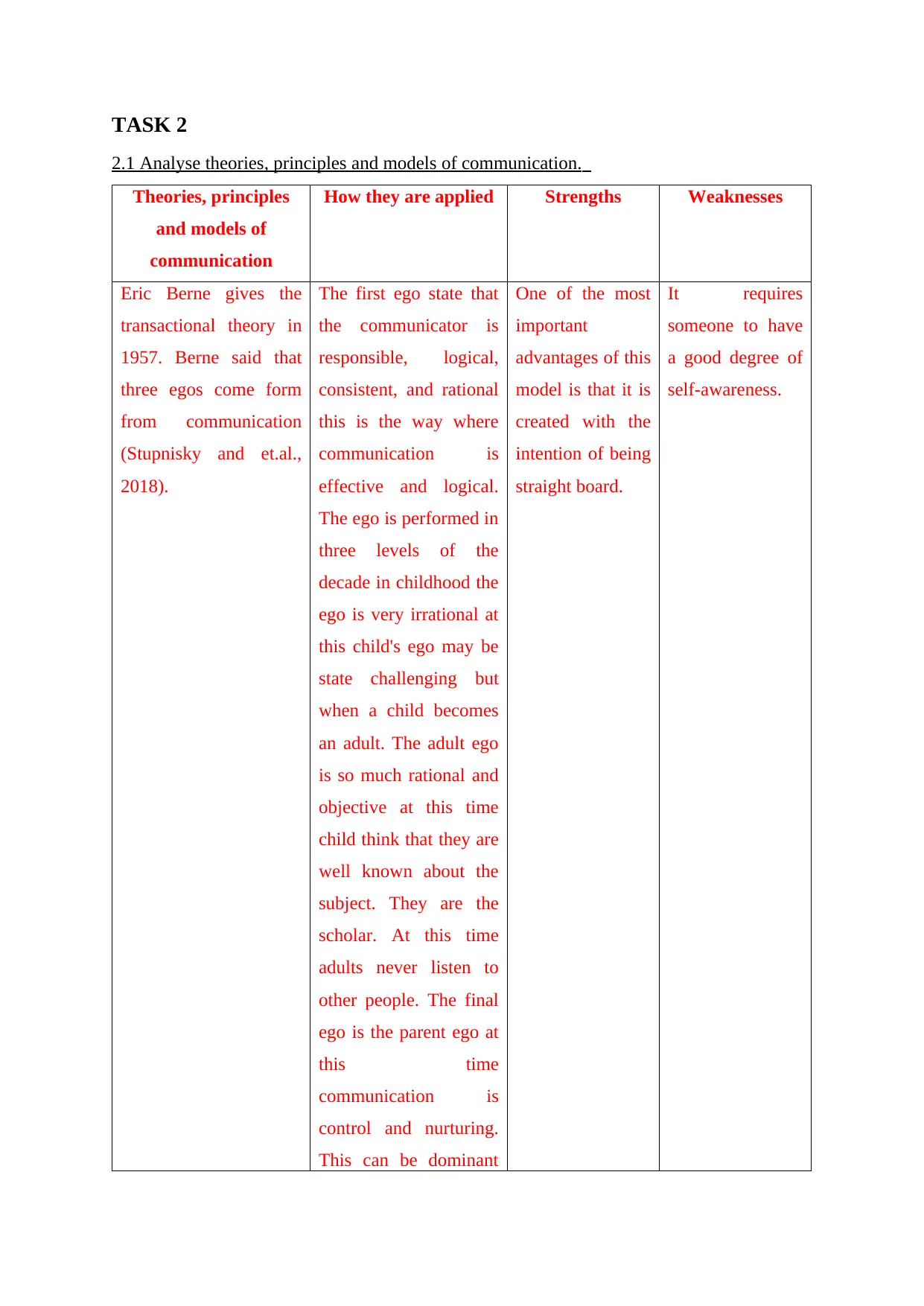
TASK 2
2.1 Analyse theories, principles and models of communication.
Theories, principles
and models of
communication
How they are applied Strengths Weaknesses
Eric Berne gives the
transactional theory in
1957. Berne said that
three egos come form
from communication
(Stupnisky and et.al.,
2018).
The first ego state that
the communicator is
responsible, logical,
consistent, and rational
this is the way where
communication is
effective and logical.
The ego is performed in
three levels of the
decade in childhood the
ego is very irrational at
this child's ego may be
state challenging but
when a child becomes
an adult. The adult ego
is so much rational and
objective at this time
child think that they are
well known about the
subject. They are the
scholar. At this time
adults never listen to
other people. The final
ego is the parent ego at
this time
communication is
control and nurturing.
This can be dominant
One of the most
important
advantages of this
model is that it is
created with the
intention of being
straight board.
It requires
someone to have
a good degree of
self-awareness.
2.1 Analyse theories, principles and models of communication.
Theories, principles
and models of
communication
How they are applied Strengths Weaknesses
Eric Berne gives the
transactional theory in
1957. Berne said that
three egos come form
from communication
(Stupnisky and et.al.,
2018).
The first ego state that
the communicator is
responsible, logical,
consistent, and rational
this is the way where
communication is
effective and logical.
The ego is performed in
three levels of the
decade in childhood the
ego is very irrational at
this child's ego may be
state challenging but
when a child becomes
an adult. The adult ego
is so much rational and
objective at this time
child think that they are
well known about the
subject. They are the
scholar. At this time
adults never listen to
other people. The final
ego is the parent ego at
this time
communication is
control and nurturing.
This can be dominant
One of the most
important
advantages of this
model is that it is
created with the
intention of being
straight board.
It requires
someone to have
a good degree of
self-awareness.
Paraphrase This Document
Need a fresh take? Get an instant paraphrase of this document with our AI Paraphraser
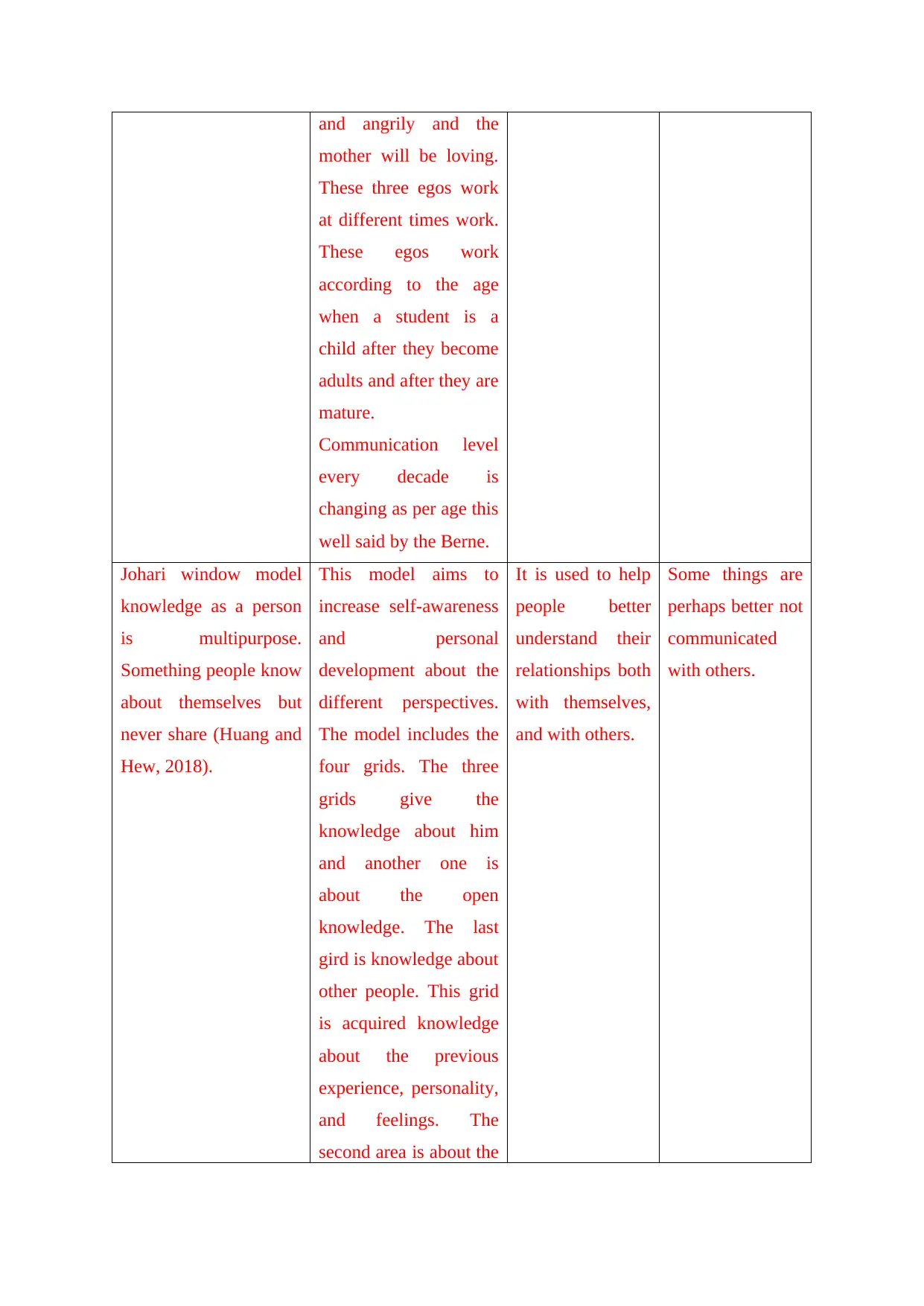
and angrily and the
mother will be loving.
These three egos work
at different times work.
These egos work
according to the age
when a student is a
child after they become
adults and after they are
mature.
Communication level
every decade is
changing as per age this
well said by the Berne.
Johari window model
knowledge as a person
is multipurpose.
Something people know
about themselves but
never share (Huang and
Hew, 2018).
This model aims to
increase self-awareness
and personal
development about the
different perspectives.
The model includes the
four grids. The three
grids give the
knowledge about him
and another one is
about the open
knowledge. The last
gird is knowledge about
other people. This grid
is acquired knowledge
about the previous
experience, personality,
and feelings. The
second area is about the
It is used to help
people better
understand their
relationships both
with themselves,
and with others.
Some things are
perhaps better not
communicated
with others.
mother will be loving.
These three egos work
at different times work.
These egos work
according to the age
when a student is a
child after they become
adults and after they are
mature.
Communication level
every decade is
changing as per age this
well said by the Berne.
Johari window model
knowledge as a person
is multipurpose.
Something people know
about themselves but
never share (Huang and
Hew, 2018).
This model aims to
increase self-awareness
and personal
development about the
different perspectives.
The model includes the
four grids. The three
grids give the
knowledge about him
and another one is
about the open
knowledge. The last
gird is knowledge about
other people. This grid
is acquired knowledge
about the previous
experience, personality,
and feelings. The
second area is about the
It is used to help
people better
understand their
relationships both
with themselves,
and with others.
Some things are
perhaps better not
communicated
with others.
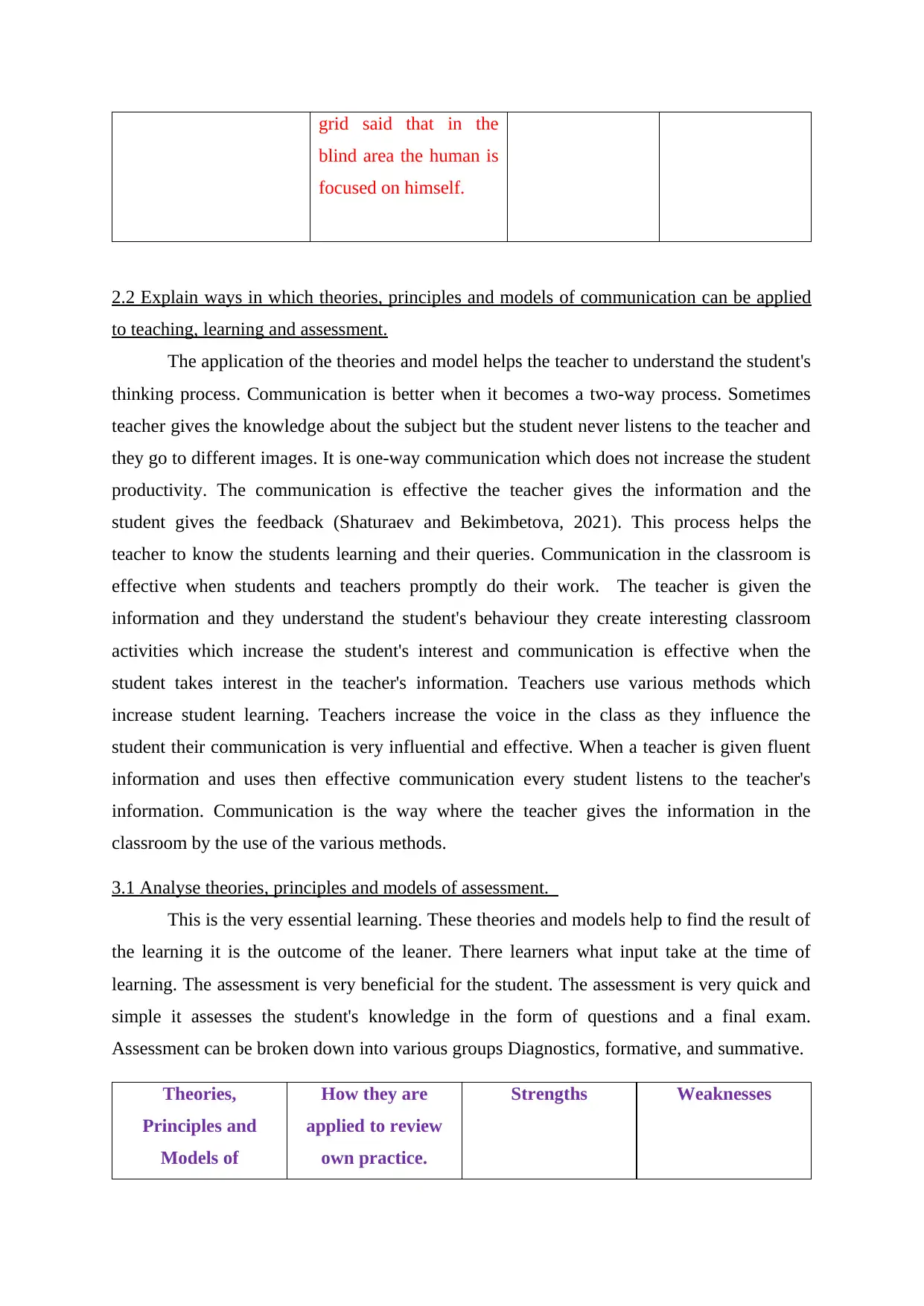
grid said that in the
blind area the human is
focused on himself.
2.2 Explain ways in which theories, principles and models of communication can be applied
to teaching, learning and assessment.
The application of the theories and model helps the teacher to understand the student's
thinking process. Communication is better when it becomes a two-way process. Sometimes
teacher gives the knowledge about the subject but the student never listens to the teacher and
they go to different images. It is one-way communication which does not increase the student
productivity. The communication is effective the teacher gives the information and the
student gives the feedback (Shaturaev and Bekimbetova, 2021). This process helps the
teacher to know the students learning and their queries. Communication in the classroom is
effective when students and teachers promptly do their work. The teacher is given the
information and they understand the student's behaviour they create interesting classroom
activities which increase the student's interest and communication is effective when the
student takes interest in the teacher's information. Teachers use various methods which
increase student learning. Teachers increase the voice in the class as they influence the
student their communication is very influential and effective. When a teacher is given fluent
information and uses then effective communication every student listens to the teacher's
information. Communication is the way where the teacher gives the information in the
classroom by the use of the various methods.
3.1 Analyse theories, principles and models of assessment.
This is the very essential learning. These theories and models help to find the result of
the learning it is the outcome of the leaner. There learners what input take at the time of
learning. The assessment is very beneficial for the student. The assessment is very quick and
simple it assesses the student's knowledge in the form of questions and a final exam.
Assessment can be broken down into various groups Diagnostics, formative, and summative.
Theories,
Principles and
Models of
How they are
applied to review
own practice.
Strengths Weaknesses
blind area the human is
focused on himself.
2.2 Explain ways in which theories, principles and models of communication can be applied
to teaching, learning and assessment.
The application of the theories and model helps the teacher to understand the student's
thinking process. Communication is better when it becomes a two-way process. Sometimes
teacher gives the knowledge about the subject but the student never listens to the teacher and
they go to different images. It is one-way communication which does not increase the student
productivity. The communication is effective the teacher gives the information and the
student gives the feedback (Shaturaev and Bekimbetova, 2021). This process helps the
teacher to know the students learning and their queries. Communication in the classroom is
effective when students and teachers promptly do their work. The teacher is given the
information and they understand the student's behaviour they create interesting classroom
activities which increase the student's interest and communication is effective when the
student takes interest in the teacher's information. Teachers use various methods which
increase student learning. Teachers increase the voice in the class as they influence the
student their communication is very influential and effective. When a teacher is given fluent
information and uses then effective communication every student listens to the teacher's
information. Communication is the way where the teacher gives the information in the
classroom by the use of the various methods.
3.1 Analyse theories, principles and models of assessment.
This is the very essential learning. These theories and models help to find the result of
the learning it is the outcome of the leaner. There learners what input take at the time of
learning. The assessment is very beneficial for the student. The assessment is very quick and
simple it assesses the student's knowledge in the form of questions and a final exam.
Assessment can be broken down into various groups Diagnostics, formative, and summative.
Theories,
Principles and
Models of
How they are
applied to review
own practice.
Strengths Weaknesses
⊘ This is a preview!⊘
Do you want full access?
Subscribe today to unlock all pages.

Trusted by 1+ million students worldwide
1 out of 18
Related Documents
Your All-in-One AI-Powered Toolkit for Academic Success.
+13062052269
info@desklib.com
Available 24*7 on WhatsApp / Email
![[object Object]](/_next/static/media/star-bottom.7253800d.svg)
Unlock your academic potential
Copyright © 2020–2026 A2Z Services. All Rights Reserved. Developed and managed by ZUCOL.
